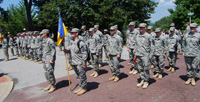Editorial
Front Page - Friday, September 17, 2010
UTC produces the next generation of Army officers
David Laprad
 About 75 students are taking Reserve Officers Training Corps classes at the University of Tennessee at Chattanooga. Through a structured curriculum maintained by the United States Army Cadet Command, ROTC staff train the students to become the next generation of Army officers.
- David Laprad
About 75 students are taking Reserve Officers Training Corps classes at the University of Tennessee at Chattanooga. Through a structured curriculum maintained by the United States Army Cadet Command, ROTC staff train the students to become the next generation of Army officers.
- David Laprad
In the 1970s, the United States Army became an all-volunteer force. Young men were no longer drafted into the military, as they had been, but were given a choice about whether or not to serve. Now, in a new time of national distress, this nation’s sons and daughters are hearing the call to service from a different source: within themselves.
Some of these young men and women find their way to the Reserve Officers Training Corps at the University of Tennessee at Chattanooga. When they arrive, Major John Brauneis, head of the ROTC unit at UTC, is waiting for them.
“They come from different backgrounds. Some students come from a military background, where one or both parents were or are currently in the military, and they want to pursue the same path. Others come from families in which no one has served, but they wish to do so. Still others are sampling. The one thing they all have in common is they care about their country and each other,” Brauneis says.
The unofficial mission of the ROTC is to produce the next generation of Army officers. This is accomplished through a structured curriculum maintained by the United States Army Cadet Command. Throughout eight semesters of military science classes, the ROTC program develops students into the kinds of leaders the Army requires.
“This is the process by which we prepare these individuals for leadership roles in the Army,” Brauneis says.
Brauneis says ROTC is not boot camp; therefore, it does not involve the kind of rigorous physical training or emotional intensity seen in the movie, “An Officer and a Gentleman.” Rather, the instruction involves class time and weekly labs.
The goal of the labs is to prepare cadets for the summer training camp, or Leader-ship Development Assessment Course. The 30-day camp takes place each summer in Fort Lewis, Wash., and involves 6,500 juniors from around the nation.
Cadets are divided into 14 regiments and challenged to pass an Army physical, a land navigation written test, a land navigation day test and a land navigation night test using the techniques they learned in their labs.
“Each event is challenging, depending on the person. The written test, in which the cadets have to figure out compass declinations and things like that, challenge some individuals, while those who haven’t spent much time in the wilderness have to overcome their fears to complete the other tasks,” Brauneis says.
The camp also involves obstacle courses, leadership challenges and squad tactical exercises. When it’s all said and done, the Army stacks the cadets against each other and rates them. Where an individual lands determines the position the Army will offer him or her upon graduation from school.
Regardless of where they end up, graduates will be in a position of responsibility over other soldiers as a result of having completed the ROTC program. Brauneis compares this to starting a few rungs up the corporate ladder in the civilian sector.
“When you arrive at your first point of duty in the Army, it will be assumed you know a particular body of knowledge, and there will be a multitude of duties you will be expected to perform. You might have anywhere from ten to 50 soldiers relying on you,” he says.
Brauneis has full confidence his cadets will rise to the occasion. “The ideal cadet is intelligent, able to work with others and follow as well as lead. Basically, we’re looking for balanced individuals who can work and play well with others. For the most part, those are the kind of people who find their way into our program,” he says.
Unlike signing on the dotted line at the U.S. Army recruiting office, joining the ROTC program does not obligate a cadet to join the Army. When a cadet does accept a commission, the Army contracts him or her for three years of active service.
The ROTC unit at UTC was established in 2007 after a ten-year hiatus. Brauneis credits the Chattanooga community and its support with the success of the program. In July, for example, the unit’s first graduated lieutenant returned from Iraq, and two more are preparing to enter service. In addition, the current unit has as many as 75 students taking classes.
Brauneis is looking forward to watching these cadets develop and then following them throughout their career, whatever they choose to do.
“This program teaches young
people about responsibility. It teaches them to work with other people to accomplish large goals. And it teaches them to be self-reliant. As an Army lieutenant, these things are necessary.
“We have some fine young men and women. It’s going to be amazing to watch them grow. And it’s going to be incredible to see what they produce.”
For more information about the ROTC at UTC, call 423-425-5581.
|
|